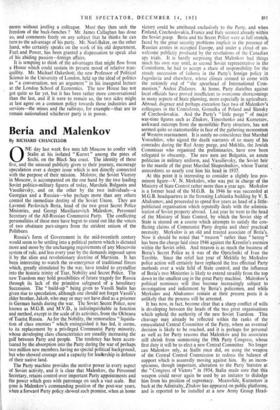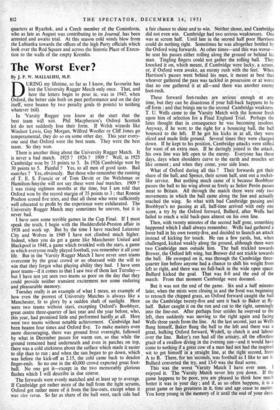Beria and Malenkov
By RICHARD CHANCELLOR
0 NE day last week five men left Moscow to confer with Stalin at his isolated " Kurort " among the pines of Sochi, on the Black Sea coast. The identity of these five, and the unusual publicity given to their journey, encourage speculation over a deeper issue which is not directly connected with the purpose of their mission. Molotov, the Soviet Viceroy in Moscow, is accompanied on, the one hand by the two leading Soviet politico-military figures of today, Marshals Bulganin and Vassilievsky, and on the other by the two individuals—a Georgian and a Russian—who perhaps more than any others control the immediate destiny of the Soviet Union. They are Lavrenti Pavlovitch Beria, head of the two great Secret Police Ministries, and Georgi Maxilianovitch Malenkov, Personnel Secretary of the All-Russian Communist Party. The conflicting personalities of these men have begun to stand out like the voices of two obstinate part-singers from the strident unison of the Politburo.
Russia's form of Government in the mid-twentieth century would seem to be settling into a political pattern which is dictated more and more by the unchanging requirements of any Muscovite system of rule, and less every year by the demands imposed upon it by the alien and revolutionary doctrine of Marxism. It has been interesting to swatch the re-emergence of traditional forces which, greatly stimulated by the war, have tended to crystallise into the historic trinity of Tsar, Nobility and Secret Police. The new Tsardom may hold possibilities of future tragedy for Russia through its lack of the primitive safeguard of a hereditary Succession. The " build-up " being given to Vassili Stalin has given rise to speculation, although one should not forget Vassili's elder brother, Jakob, who may or may not have died as a prisoner in German hands during the war. The Soviet Secret Police, now known as M.G.B. and M.V.D., is indistinguishable in function and method, except in the scale of its activities, from the Okhrana of Tsarist Russia. As for the Nobility, the remorseless "liquida- tion of class enemies" which extinguished it has led, it seems, to its replacement by a privileged Communist Party minority, whose developing class characteristics are steadily increasing the gulf between Pasty and people. The tendency has been accen- tuated by the absorption into the Party during the war of perhaps two million new members having no special political background, but who showed courage and a capacity for leadership in defence of- their native land.
The Party machine provides the motive power in every aspect of Soviet activity, and it is clear that Malenkov, the Personnel Secretary, retains control over important Party appointments and the power which goes with patronage on such a vast scale. But gone is Malenkov's commanding position of the post-war years, when a forward Patty policy showed such promise, when at home victory could be attributed exclusively to the Party, and when Finland, Czechoslovakia, France and Italy seemed already within the Soviet grasp. Beria and his Secret Police were at full stretch. faced by the great security problems implicit in the presence of Russian armies in occupied Europe, and under a cloud of un- welcome publicity produced by the revelations of the Canadian spy trials. It is hardly surprising that Malenkov had things much his own way until, as second Soviet representative in the Cominform, he had to accept a share of responsibility for the steady succession of failures in the Party's foreign policy in Jugoslavia and elsewhere, whose climax seemed to come with the untimely end of "the spearhead of International Com- munism," Andrei Zhdanov. At home, Party diatribes against local officials have proved insufficient to overcome shortcomings in many aspects of State planning, more especially in agriculture. Abroad, disgrace and perhaps execution face two of Malenkov's colleagues in the Cominform, Gomulka of Poland and Slansky of Czechoslovakia. And the Party's "little purge" of major war-time figures such as Zhukov, Timoshenko and Kuznetsov, awkward outcrops from the monolithic Party structure, has not seemed quite so statesmanlike in face of the gathering momentum of Western rearmament. It is surely no coincidence that Marshal Voroshilov, who signed the death warrants of so many of his comrades during the Red Army purge, and Mekhlis, the Jewish Commissar who organised the preliminaries, have now been relegated to obscurity. The new men are Bulganin, an astute politician in military uniform, and Vassilievsky, the Soviet heir to the mantle of the great Marshal Shaposhnikov, whose Tsarist antecedents so nearly cost him his head in 1937.
At this point it is interesting to consider a slightly less pro- minent figure—V. N. Merkulov-who was put in charge of the Ministry of State Control rather more than a year ago. Merkulov is a former head of the M.G.B. In 1946 he was succeeded at M.G.B. headquarters in the frowning Lubianka building by V. S. Abakumov, and proceeded to spend five years as head of a little- publicised organisation which reputedly deals with the adminis- tration of Soviet property abroad. Last year he went to the head of the Ministry of State Control, by which the Soviet ship of State is steered on a course which attempts to satisfy the con- flicting claims of Communist Party dogma and sheer practical necessity. Merkulov is an old and trusted associate of Beria's. Now it should be noted that " treason " rather than " heresy " has been the charge laid since 1946 against the Kremlin's enemies within the Soviet orbit. And treason is as much the business of Beria's Secret Police as it was of the Oprichniki of Ivan the Terrible. Since the relief last year of Mekhlis by Merkulov police action will certainly have replaced the less effectual Party methods over a wide field of State control, and the influence of Beria's two Ministries is likely to extend steadily from the top down to the smallest cog in the great Party machine. Malenkov's political nominees will thus become increasingly subject to investigation and' indictment by Beria's policemen, and while Merkulov and Abakumov remain at their present posts it is unlikely that the process will be arrested.
• It has now, in fact, become clear that a sharp conflict of wills is developing between the heads of the two great organisations which uphold the authority of the new Soviet Tsardom. This cleavage may already be reflected within the ranks of the emasculated Central Committee of the Party, where an eventual decision is likely to be reached, and it is perhaps for personal as well as for Party reasons that Malenkov and his associates still shrink from summoning the 19th Party Congress, whose first duty it will be to elect a new Central Committee. No longer can-Malenkov rely, as Stalin once did, on using the weapon of the Central Control Commission to redress the balance of support which is assuredly moving against him. By an incon- spicuous, though important, alteration to the Party Statutes at the "Congress of Victors" in 1934. Stalin made sure that this weapon could never again be used by an imitator to dislodge him from his position of supremacy. Meanwhile, Kuznetsov is back at the Admiralty, Zhukov has appeared on public platforms, and is reported to be installed at a new Army Group Head- quarters at Ryazhsk, and a Czech member of the Cominform, who as late as August was contributing to its Journal, has been arrested and awaits trial. At this season cold winds blow from the Lubianka towards the offices of the high Party officials which look over the Red Square and across the historic Place of Execu- tion to the walls of the empty Kremlin.







































 Previous page
Previous page